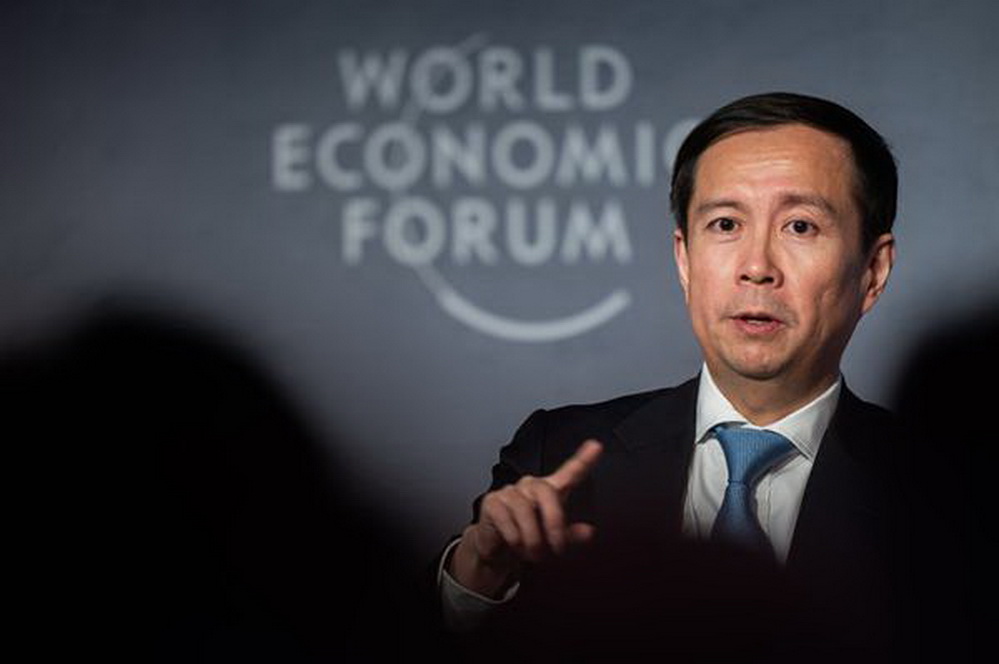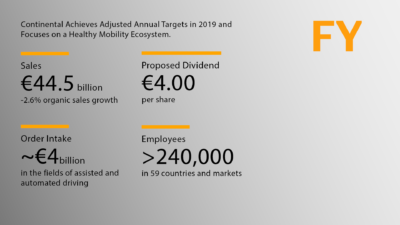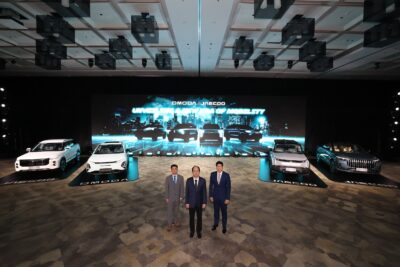
In this era of platform-based economies, business success and growth are sustainable only when all stakeholders contribute and benefit together, Alibaba Chairman and CEO Daniel Zhang said Wednesday.
Speaking onstage with Accenture CEO Julie Sweet at the World Economic Forum in Davos, Zhang emphasized how vital it is for deeply intertwined participants in a platform economy to develop a common vision through mutual understanding and collaboration.
“With recent development of technologies, there will be new platforms arising here and there. But for the whole society, in business partnership, we need to find a way to understand each other, so everyone could be a platform and everyone is a stakeholder to each other…The key is, ‘do we share a vision?’ That’s the core of the collaboration and the core of stakeholder capitalism. If we share the same vision, share the same goal, then we can find the right way to get there,” said Zhang.
While Alibaba is today an example of one of the world’s largest platform economies, it wasn’t always that way, Zhang said, harking back to the company’s founding two decades ago. Back in 1999, the founding team didn’t set out to create one of the world’s largest platform economies, serving over 700 million users, enabling millions of merchants and brands and helping create over 40 million jobs, directly and indirectly, in China alone.
Initially, Alibaba focused on its mission “to make it easy to do business anywhere” and dedicated itself to empowering all the merchants on its platform, helping them generate more business. The metamorphosis into a platform economy has been evolutionary, with the growth of business leading to even more consumer demand, job creation and expansion into other complementary, infrastructural areas, such as delivery services, logistics and mobile payments.
“We create opportunities as we help businesses create new demands. For example, you need new labor in the warehouse. When you have so many packages every day, you need deliverymen. All the stakeholders operate in the same rhythm, and we create together through the platform,” said Zhang.
Zhang emphasized there’s no longer any question about whether a platform economy needs to be inclusive. Instead, good leaders are focused on how to ensure everyone in broader society can reap the benefits of new technologies and share in economic and business growth.
“This needs not only the vision of a leader, but also the leader’s guidance in terms of how and to create a mechanism that will make all the people not only reach a consensus, but can also take real actions,” Zhang said.
To be an innovative leader, one must think differently and “structure a new business which addresses the pain points of customers,” as well as align all the resources across the organization, he added.
Alibaba, he said, has helped foster a positive social cycle that allows merchants on the platform to donate a small part of their sales to a charitable cause. As experience has shown, consumers like and purchase more of these donation-tagged products, helping merchants generate more sales and even-bigger donations.
A platform-based economy can also be a powerful tool in poverty reduction, said Zhang. To help farmers and sellers in China’s impoverished regions, Alibaba offers digital know-how, helping the poor and unfortunate create their own sustainable digital businesses that can sell local products nationwide.
About Alibaba Group
Alibaba Group’s mission is to make it easy to do business anywhere. The company aims to build the future infrastructure of commerce. It envisions that its customers will meet, work and live at Alibaba and that it will be a company that lasts for 102 years.
For Thai-language news and updates from Alibaba Group, please visit th.alibabanews.com/

In this era of platform-based economies, business success and growth are sustainable only when all stakeholders contribute and benefit together, Alibaba Chairman and CEO Daniel Zhang said Wednesday.
Speaking onstage with Accenture CEO Julie Sweet at the World Economic Forum in Davos, Zhang emphasized how vital it is for deeply intertwined participants in a platform economy to develop a common vision through mutual understanding and collaboration.
"With recent development of technologies, there will be new platforms arising here and there. But for the whole society, in business partnership, we need to find a way to understand each other, so everyone could be a platform and everyone is a stakeholder to each other...The key is, 'do we share a vision?' That's the core of the collaboration and the core of stakeholder capitalism. If we share the same vision, share the same goal, then we can find the right way to get there," said Zhang.
While Alibaba is today an example of one of the world's largest platform economies, it wasn't always that way, Zhang said, harking back to the company's founding two decades ago. Back in 1999, the founding team didn't set out to create one of the world's largest platform economies, serving over 700 million users, enabling millions of merchants and brands and helping create over 40 million jobs, directly and indirectly, in China alone.
Initially, Alibaba focused on its mission "to make it easy to do business anywhere" and dedicated itself to empowering all the merchants on its platform, helping them generate more business. The metamorphosis into a platform economy has been evolutionary, with the growth of business leading to even more consumer demand, job creation and expansion into other complementary, infrastructural areas, such as delivery services, logistics and mobile payments.
"We create opportunities as we help businesses create new demands. For example, you need new labor in the warehouse. When you have so many packages every day, you need deliverymen. All the stakeholders operate in the same rhythm, and we create together through the platform," said Zhang.
Zhang emphasized there's no longer any question about whether a platform economy needs to be inclusive. Instead, good leaders are focused on how to ensure everyone in broader society can reap the benefits of new technologies and share in economic and business growth.
"This needs not only the vision of a leader, but also the leader's guidance in terms of how and to create a mechanism that will make all the people not only reach a consensus, but can also take real actions," Zhang said.
To be an innovative leader, one must think differently and "structure a new business which addresses the pain points of customers," as well as align all the resources across the organization, he added. Alibaba, he said, has helped foster a positive social cycle that allows merchants on the platform to donate a small part of their sales to a charitable cause. As experience has shown, consumers like and purchase more of these donation-tagged products, helping merchants generate more sales and even-bigger donations.
A platform-based economy can also be a powerful tool in poverty reduction, said Zhang. To help farmers and sellers in China's impoverished regions, Alibaba offers digital know-how, helping the poor and unfortunate create their own sustainable digital businesses that can sell local products nationwide.
About Alibaba Group
Alibaba Group's mission is to make it easy to do business anywhere. The company aims to build the future infrastructure of commerce. It envisions that its customers will meet, work and live at Alibaba and that it will be a company that lasts for 102 years.
For Thai-language news and updates from Alibaba Group, please visit th.alibabanews.com/




























